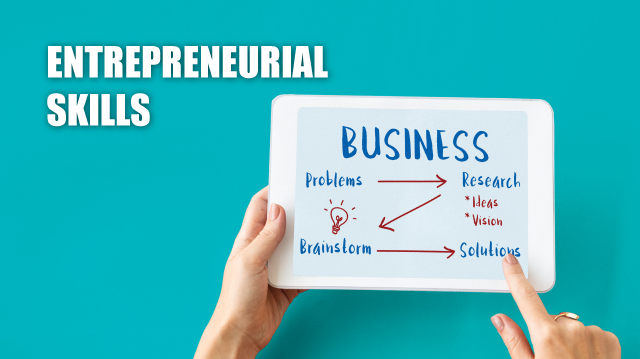


The 'Entrepreneurial Skills' course provides participants with the essential knowledge, mindset, and practical skills needed to thrive in entrepreneurship. It covers idea generation, business planning, financial management, marketing strategies, leadership, risk management, networking, legal considerations, and innovation. Participants learn to identify opportunities, develop viable business concepts, and navigate the challenges of entrepreneurship with confidence and resilience.
Overview: The Entrepreneurial Skills training program is designed to equip participants with the mindset, knowledge, and abilities needed to succeed in entrepreneurial ventures. Whether participants are aspiring entrepreneurs or individuals seeking to foster an entrepreneurial mindset within an organization, this program covers key aspects of entrepreneurship, including ideation, business planning, risk management, and innovation.
Objective:
• Foster Entrepreneurial Mindset: Cultivate an entrepreneurial mindset characterized by creativity, adaptability, and resilience.
• Develop Business Acumen: Provide participants with the knowledge and skills to identify business opportunities, assess feasibility, and develop business plans.
• Enhance Innovation Skills: Teach participants how to innovate and differentiate their products or services in the market.
• Promote Risk Management: Equip participants with strategies for managing risks associated with entrepreneurship.
• Encourage Collaboration and Networking: Foster collaboration, networking, and resource mobilization among participants.
• Empower Action: Inspire participants to take action and pursue entrepreneurial opportunities with confidence and determination.
Training Content:
1. Introduction to Entrepreneurship
• Understanding the entrepreneurial mindset
• Overview of entrepreneurship as a career path
• Importance of entrepreneurship in driving economic growth and innovation
2. Identifying Opportunities
• Techniques for identifying business opportunities and gaps in the market
• Conducting market research and feasibility analysis
• Leveraging emerging trends and technologies for entrepreneurial ventures
3. Idea Generation and Validation
• Methods for generating and validating business ideas
• Assessing the viability and scalability of business concepts
• Prototyping and testing minimum viable products (MVPs)
4. Business Planning and Strategy
• Components of a comprehensive business plan
• Setting clear goals, objectives, and milestones
• Developing strategies for market entry, growth, and sustainability
5. Financial Management for Entrepreneurs
• Basics of financial management and accounting
• Creating financial projections and budgets
• Securing funding and managing cash flow
6. Marketing and Sales Strategies
• Developing marketing strategies to reach target customers
• Branding and positioning for competitive advantage
• Techniques for effective selling and customer relationship management
7. Innovation and Product Development
• Cultivating a culture of innovation within the organization
• Methods for generating and evaluating innovative ideas
• Design thinking and rapid prototyping for product development
8. Risk Management and Resilience
• Identifying and mitigating risks associated with entrepreneurship
• Building resilience to overcome challenges and setbacks
• Strategies for managing uncertainty and adapting to change
9. Legal and Regulatory Considerations
• Understanding legal structures for businesses (e.g., sole proprietorship, partnership, corporation)
• Compliance with regulations and licensing requirements
• Intellectual property protection and contract management
10. Leadership and Team Building
• Characteristics of effective entrepreneurial leaders
• Building and leading high-performing teams
• Fostering a culture of innovation, collaboration, and accountability
11. Networking and Resource Mobilization
• Leveraging networks for mentorship, collaboration, and support
• Accessing resources and funding opportunities (e.g., venture capital, angel investors, crowdfunding)
• Pitching ideas and securing partnerships
12. Scaling and Growth Strategies
• Strategies for scaling a business and entering new markets
• Managing growth while maintaining agility and sustainability
• Evaluating exit strategies and succession planning
Training Methods:
• Lectures and Presentations: Deliver foundational knowledge and key concepts.
• Interactive Workshops: Engage participants in hands-on exercises, case studies, and group discussions.
• Business Simulation: Simulate real-world entrepreneurial scenarios to apply learned concepts.
• Guest Speakers: Invite successful entrepreneurs and industry experts to share insights and experiences.
• Field Visits: Organize visits to entrepreneurial hubs, startups, or innovation centers for firsthand exposure.
• Mentorship: Provide access to mentorship programs for personalized guidance and support.
• Pitch Competitions: Organize pitch competitions to showcase participants' business ideas and receive feedback.
Week 1: Introduction to Entrepreneurship
Week 2: Business Planning and Strategy
Week 3: Financial Management
Week 4: Marketing and Sales
Week 5: Leadership and Team Building
Week 6: Risk Management and Innovation
Week 7: Networking and Legal Considerations
Week 8: Final Presentations and Wrap-Up
| Item | Description | Sponsored By |
|---|